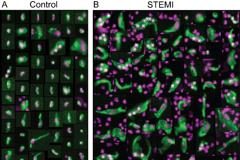New Blood Test Could Detect Heart Disease In People With No...
A more sensitive version of a blood test typically used to confirm that someone is having a heart attack could indicate whether a seemingly healthy, middle-aged person has unrecognized heart disease and an increased risk of dying, UT Southwestern Medical Center researchers have found.
Silent Vascular Disease Accompanies Cognitive Decline In Healthy Aging
Older people who are leading active, healthy lifestyles often have silent vascular disease that can be seen on brain scans that affect their ability to think, according to a new study led by UC Davis researchers and published online in the Archives of Neurology, one of the JAMA Archives journals.
Statins: Benefits Questionable In Low-Risk Patients, Review Finds
There is not enough evidence to recommend the widespread use of statins in people with no previous history of heart disease, according to a new Cochrane Systematic Review. Researchers say statins should be prescribed with caution in those at low risk of cardiovascular disease (CVD).
New Way To Abate Heart Attacks Before Patients Get To The...
Paramedics can reduce someone's chances of having a cardiac arrest or dying by 50 percent by immediately administering a mixture of glucose, insulin and potassium ("GIK") to people having a heart attack, according to research presented March 27 at the American College of Cardiology's 61st Annual Scientific Session.
Calorie-Restricted Diet Keeps Heart Young
People who restrict their caloric intake in an effort to live longer have hearts that function more like those in people who are 20 years younger. Researchers at Washington University School of Medicine in St. Louis have found that a key measure of the heart's ability to adapt to physical activity, stress, sleep and other factors that influence the rate at which the heart pumps blood, doesn't decline nearly as rapidly in people who have significantly restricted their caloric intake for an average of seven years.
Report Examines Whether Statins Prevent Death In High-Risk Individuals Without Heart...
A meta-analysis of previously published studies finds no evidence that statins are associated with a reduced risk of death among individuals at risk for but with no history of cardiovascular disease, according to a report in the June 28 issue of Archives of Internal Medicine, one of the JAMA/Archives journals.
Doctors Find Clue In Quest To Predict Heart Attack
Too often, people pass a cardiac checkup only to collapse with a heart attack days later. Now scientists have found a clue that one day may help doctors determine if a heart attack is imminent, in hopes of preventing it. Most heart attacks happen when fatty deposits in an artery burst open, and a blood clot then forms to seal the break. If the clot is too big, it blocks off blood flow.
Vegans’ Requires Omega-3s and B12, Study Suggests
People who follow a vegan lifestyle -- strict vegetarians who try to eat no meat or animal products of any kind -- may increase their risk of developing blood clots and atherosclerosis or "hardening of the arteries," which are conditions that can lead to heart attacks and stroke. That's the conclusion of a review of dozens of articles published on the biochemistry of vegetarianism during the past 30 years. The article appears in ACS' Journal of Agricultural and Food Chemistry.
Consumption Of ‘Good Salt’ Can Reduce Population Blood Pressure Levels, Research...
An increased intake of 'good' potassium salts could contribute significantly to improving blood pressure at the population level, according to new research. The favorable effect brought about by potassium is even estimated to be comparable with the blood pressure reduction achievable by halving the intake of 'bad' sodium salts (mostly from table salt).
Free Radicals May Be Good for You
Fear of free radicals may be exaggerated, according to scientists from the Swedish medical university Karolinska Institutet. A new study, published in The Journal of Physiology, shows that free radicals act as signal substances that cause the heart to beat with the correct force.
Eating Your Greens Can Change the Effect Of Your Genes On...
A long-held mantra suggests that you can't change your family, the genes they pass on, or the effect of these genes. Now, an international team of scientists, led by researchers at McMaster and McGill universities, is attacking that belief.
Satisfaction With The Components Of Everyday Life Appears Protective Against Heart...
While depression and anxiety have long been recognised as risk factors for heart disease, there is less certainty over the beneficial effects of a 'positive' psychological state, Now, following a study of almost 8000 British civil servants, researchers say that a satisfying life is indeed good for the heart.















